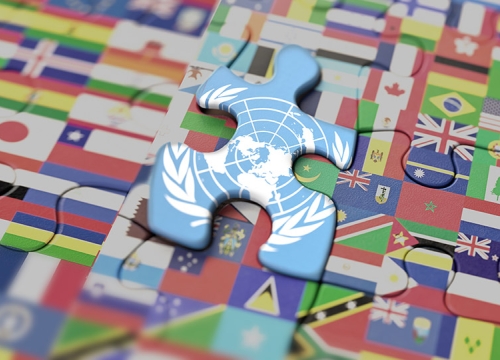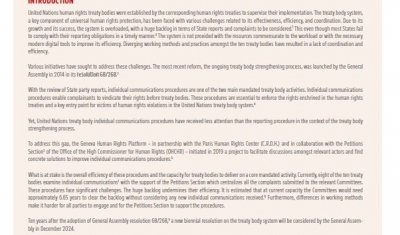‘Urgency Measures’ to face a triple crisis – what insights can be taken from the Treaty Body strengthening process?
Event


Adobe Stock
Side Event to the 37th Treaty Body Chairpersons Meeting
Co-organizers:
- The Geneva Human Rights Platform
- Permanent Mission of Switzerland to the United Nations
Date and Venue:
- Date: 4 June 2025, 1:30 – 3.00 pm CEST (a light lunch will be provided before the event)
- Venue: Conference Room, Ground Floor, Palais Wilson
Background:
The United Nations human rights treaty bodies are at crossroads. When discussions over the last decade focused on efforts to enhance the effectiveness and efficiency of their work in order to strengthen the universality of human rights, current debates circle around the question of what part of the status quo can be maintained, in times of a triple crisis of budget, cash-flow, and politics.
Due to the political and financial situation which affects all of the United Nations, and the human rights mechanisms in particular, sessions of the Treaty Bodies have been shortened, and are currently confirmed only up to July 2025. The holding of further sessions is termed ‘uncertain’ to ‘highly unlikely’.
This crippling of sessions immediately undoes the achievements of recent years, where not only backlogs of reports in most TBs have been reduced, but most notably a shift to a predictable fixed reporting calendar seemed at hand.
Initiated by the report of the High Commissioner for Human Rights Navi Pillay in 2012, the ten-year process of strengthening these bodies has led to significant developments, including the Chairs’ conclusions of June 2022, the OHCHR Working Paper of May 2023, and the Chairs’ conclusions of June 2023 and the Chairs’ Conclusions of June 2024. These milestones, derived from the co-facilitation process on treaty body review 2020, aimed to address the challenges faced by the treaty bodies and to improve their functioning. A major step forward were the achievements towards the establishment of a fixed calendar for State reviews and the harmonization of working methods, coupled with the decision to establish an inter-committee Advisory Mechanism on Harmonization.
As part of this continuous effort, the Geneva Human Rights Platform has supported the treaty bodies through facilitating discussions on substantive issues and working methods and in particular via the organization of a series of informal meetings, the latest one in December 2024 focusing on practical achievements of harmonization and an ‘all-mechanisms’ approach. Skepticism present already in December 2024 about what steps could be realized in what time-frame has since been aggravated by the current crisis.
Objectives:
- Provide an update on the current situation of the TB system,
- Discuss the implications of recently announced saving measures on the functioning of the TBs and the potential to maintain universality via a fixed predictable review schedule,
- Offer insights on how measures discussed in the frame of a decade of TB strengthening could help to confront the current crisis,
- Explore the modalities which could be acceptable as urgency measures to maintain a minimum level of accountability and universality in the system.
Target Audience:
- Delegates from member states
- Chairpersons from UN treaty bodies
- Representatives from UN secretariat and agencies
- Civil society organizations, NHRIs and academia
Expected Outcomes:
- Enhanced understanding of the significance of the treaty body system and the treaty body strengthening process for the upholding of accountability and universality of human rights.
- Recognition of important suggestions made in a decade of TB strengthening for the current context
- Strengthened dialogue among stakeholders on the importance of temporary urgency measures to affront the triple crisis
This side event represents a critical opportunity to reflect on the innovative approaches taken through the treaty body strengthening process and to consider the future direction of the treaty body system. By fostering a dialogue on these pivotal issues, the session aims to contribute to the ongoing efforts to enhance the effectiveness of the treaty body system and to confirm the universality of human rights.
Opening:
- H.E. Julien Thöni, Deputy Permanent Representative of Switzerland to the UN in Geneva
- Olivier de Frouville, Chairperson CED and President of the Chairperson meeting
Speakers:
- Laura-Maria Crăciunean-Tatu, Chairperson, CESCR
- Nahla Haidar, Chairperson, CEDAW
- María Luisa Romero, Chairperson, SPT
- H.E. Maira Mariela Macdonal Alvarez, Permanent Representative of Bolivia
- Antti Korkeakivi, Chief of the Human Rights Treaties Branch, OHCHR
Moderation:
- Felix Kirchmeier, Executive Director, Geneva Human Rights Platform











